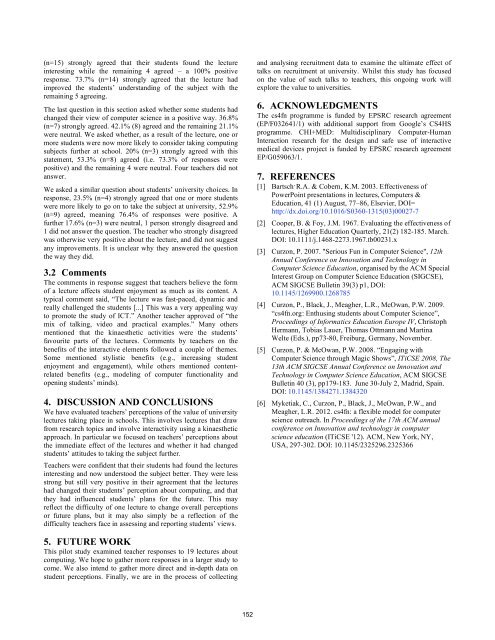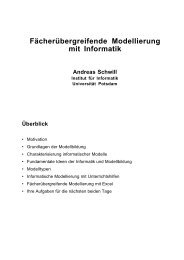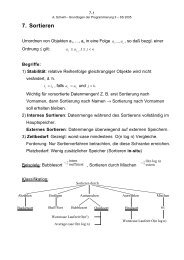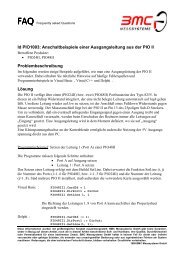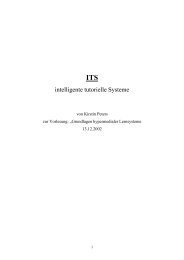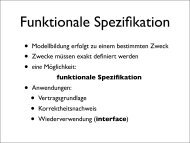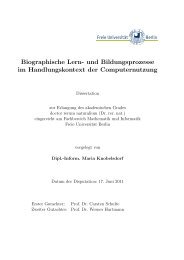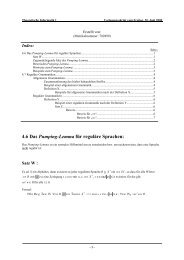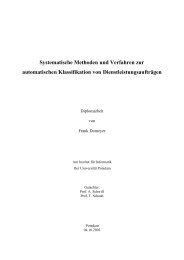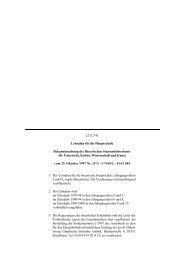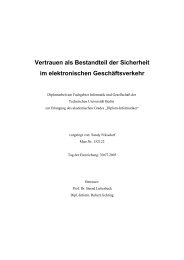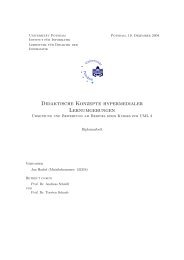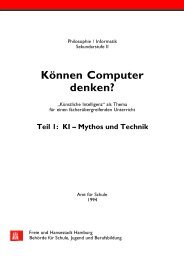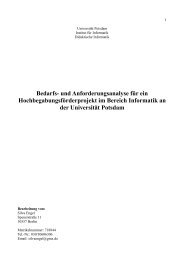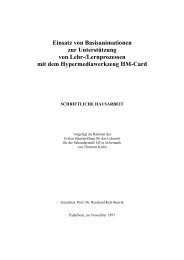Maria Knobelsdorf, University of Dortmund, Germany - Didaktik der ...
Maria Knobelsdorf, University of Dortmund, Germany - Didaktik der ...
Maria Knobelsdorf, University of Dortmund, Germany - Didaktik der ...
Create successful ePaper yourself
Turn your PDF publications into a flip-book with our unique Google optimized e-Paper software.
(n=15) strongly agreed that their students found the lecture<br />
interesting while the remaining 4 agreed – a 100% positive<br />
response. 73.7% (n=14) strongly agreed that the lecture had<br />
improved the students’ un<strong>der</strong>standing <strong>of</strong> the subject with the<br />
remaining 5 agreeing.<br />
The last question in this section asked whether some students had<br />
changed their view <strong>of</strong> computer science in a positive way. 36.8%<br />
(n=7) strongly agreed. 42.1% (8) agreed and the remaining 21.1%<br />
were neutral. We asked whether, as a result <strong>of</strong> the lecture, one or<br />
more students were now more likely to consi<strong>der</strong> taking computing<br />
subjects further at school. 20% (n=3) strongly agreed with this<br />
statement, 53.3% (n=8) agreed (i.e. 73.3% <strong>of</strong> responses were<br />
positive) and the remaining 4 were neutral. Four teachers did not<br />
answer.<br />
We asked a similar question about students’ university choices. In<br />
response, 23.5% (n=4) strongly agreed that one or more students<br />
were more likely to go on to take the subject at university, 52.9%<br />
(n=9) agreed, meaning 76.4% <strong>of</strong> responses were positive. A<br />
further 17.6% (n=3) were neutral, 1 person strongly disagreed and<br />
1 did not answer the question. The teacher who strongly disagreed<br />
was otherwise very positive about the lecture, and did not suggest<br />
any improvements. It is unclear why they answered the question<br />
the way they did.<br />
3.2 Comments<br />
The comments in response suggest that teachers believe the form<br />
<strong>of</strong> a lecture affects student enjoyment as much as its content. A<br />
typical comment said, “The lecture was fast-paced, dynamic and<br />
really challenged the students [...] This was a very appealing way<br />
to promote the study <strong>of</strong> ICT.” Another teacher approved <strong>of</strong> “the<br />
mix <strong>of</strong> talking, video and practical examples.” Many others<br />
mentioned that the kinaesthetic activities were the students’<br />
favourite parts <strong>of</strong> the lectures. Comments by teachers on the<br />
benefits <strong>of</strong> the interactive elements followed a couple <strong>of</strong> themes.<br />
Some mentioned stylistic benefits (e.g., increasing student<br />
enjoyment and engagement), while others mentioned contentrelated<br />
benefits (e.g., modeling <strong>of</strong> computer functionality and<br />
opening students’ minds).<br />
4. DISCUSSION AND CONCLUSIONS<br />
We have evaluated teachers’ perceptions <strong>of</strong> the value <strong>of</strong> university<br />
lectures taking place in schools. This involves lectures that draw<br />
from research topics and involve interactivity using a kinaesthetic<br />
approach. In particular we focused on teachers’ perceptions about<br />
the immediate effect <strong>of</strong> the lectures and whether it had changed<br />
students’ attitudes to taking the subject further.<br />
Teachers were confident that their students had found the lectures<br />
interesting and now un<strong>der</strong>stood the subject better. They were less<br />
strong but still very positive in their agreement that the lectures<br />
had changed their students’ perception about computing, and that<br />
they had influenced students’ plans for the future. This may<br />
reflect the difficulty <strong>of</strong> one lecture to change overall perceptions<br />
or future plans, but it may also simply be a reflection <strong>of</strong> the<br />
difficulty teachers face in assessing and reporting students’ views.<br />
5. FUTURE WORK<br />
This pilot study examined teacher responses to 19 lectures about<br />
computing. We hope to gather more responses in a larger study to<br />
come. We also intend to gather more direct and in-depth data on<br />
student perceptions. Finally, we are in the process <strong>of</strong> collecting<br />
152<br />
and analysing recruitment data to examine the ultimate effect <strong>of</strong><br />
talks on recruitment at university. Whilst this study has focused<br />
on the value <strong>of</strong> such talks to teachers, this ongoing work will<br />
explore the value to universities.<br />
6. ACKNOWLEDGMENTS<br />
The cs4fn programme is funded by EPSRC research agreement<br />
(EP/F032641/1) with additional support from Google’s CS4HS<br />
programme. CHI+MED: Multidisciplinary Computer-Human<br />
Interaction research for the design and safe use <strong>of</strong> interactive<br />
medical devices project is funded by EPSRC research agreement<br />
EP/G059063/1.<br />
7. REFERENCES<br />
[1] Bartsch , R.A. & Cobern, K.M. 2003. Effectiveness <strong>of</strong><br />
PowerPoint presentations in lectures, Computers &<br />
Education, 41 (1) August, 77–86, Elsevier, DOI=<br />
http://dx.doi.org/10.1016/S0360-1315(03)00027-7<br />
[2] Cooper, B. & Foy, J.M. 1967. Evaluating the effectiveness <strong>of</strong><br />
lectures, Higher Education Quarterly, 21(2) 182-185. March.<br />
DOI: 10.1111/j.1468-2273.1967.tb00231.x<br />
[3] Curzon, P. 2007. "Serious Fun in Computer Science", 12th<br />
Annual Conference on Innovation and Technology in<br />
Computer Science Education, organised by the ACM Special<br />
Interest Group on Computer Science Education (SIGCSE),<br />
ACM SIGCSE Bulletin 39(3) p1, DOI:<br />
10.1145/1269900.1268785<br />
[4] Curzon, P., Black, J., Meagher, L.R., McOwan, P.W. 2009.<br />
“cs4fn.org: Enthusing students about Computer Science”,<br />
Proceedings <strong>of</strong> Informatics Education Europe IV, Christoph<br />
Hermann, Tobias Lauer, Thomas Ottmann and Martina<br />
Welte (Eds.), pp73-80, Freiburg, <strong>Germany</strong>, November.<br />
[5] Curzon, P. & McOwan, P.W. 2008. “Engaging with<br />
Computer Science through Magic Shows”, ITiCSE 2008, The<br />
13th ACM SIGCSE Annual Conference on Innovation and<br />
Technology in Computer Science Education, ACM SIGCSE<br />
Bulletin 40 (3), pp179-183. June 30-July 2, Madrid, Spain.<br />
DOI: 10.1145/1384271.1384320<br />
[6] Myketiak, C., Curzon, P., Black, J., McOwan, P.W., and<br />
Meagher, L.R. 2012. cs4fn: a flexible model for computer<br />
science outreach. In Proceedings <strong>of</strong> the 17th ACM annual<br />
conference on Innovation and technology in computer<br />
science education (ITiCSE '12). ACM, New York, NY,<br />
USA, 297-302. DOI: 10.1145/2325296.2325366


